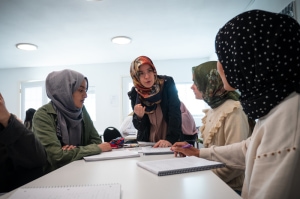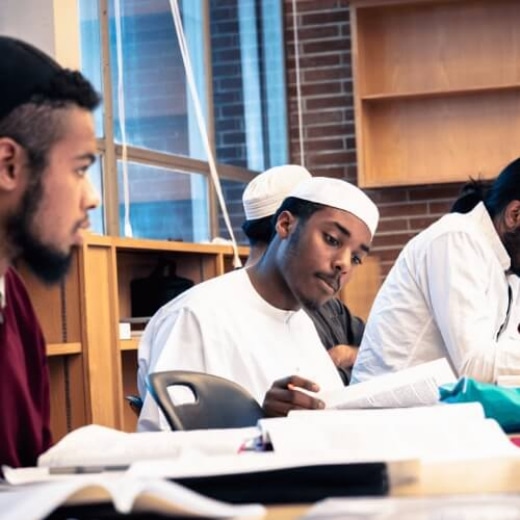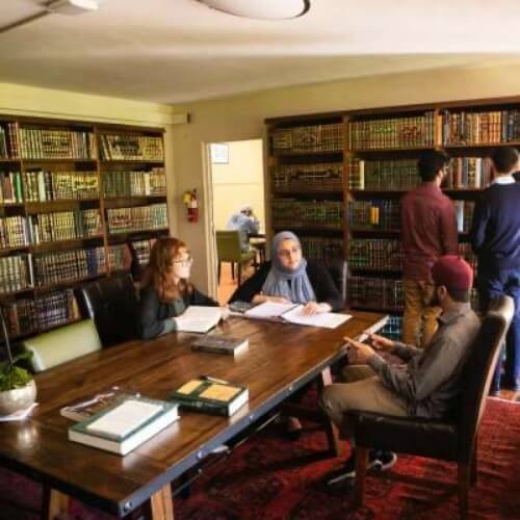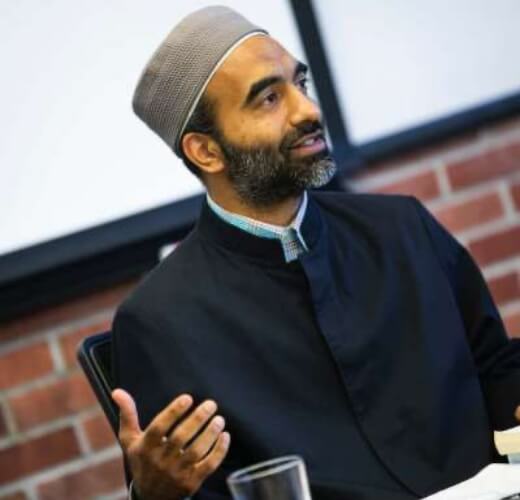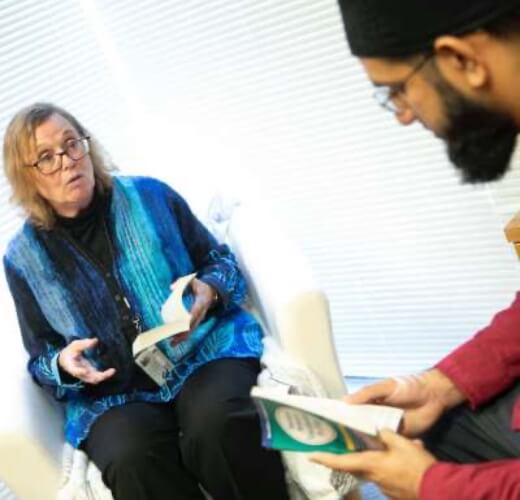Liberal Arts
Restoring a Lost Tradition
At Zaytuna College, we have set out to do our best at restoring the broad-based, holistic tradition of what in the West was called the liberal arts, and in the Muslim civilization was known as comprehensive studies (al-dirasat al-jami'ah), which lead one to become an adab, which approximates the English concept of the erudite gentleman.
The ancients understood the world not as matter without purpose but through the matrix of four causes—material, efficient, formal, and final—that placed purpose at the highest level of inquiry. This is the lens through which we can view Muslim efforts to help restore this lost tradition, beginning with the final cause, which answers the question “What is the purpose of education?” The purpose of education from an Islamic perspective—and for Zaytuna College—is to aid students in their own pursuit and discovery of the truth. The Islamic epistemological framework remains rooted in the three laws of thought: the law of identity, the law of the excluded middle, and the law of non-contradiction. Students learn this early on. In the most important theological creed in Islamic history, the Nasafiyyah, written in Central Asia in the twelfth century, Imam al-Nasafi and his commentator Imam Taftazani write,
“The people of truth assert that reality is judgment that corresponds with the actual fact. It is applied in a general sense to propositions, to articles of belief, to religions, and to different schools of practice with reference to their inclusion of reality. Its opposite is the unreal. But as for the term truth, it is especially applied to propositions; its opposite is falsehood. The distinction that may be made between these two pairs of contrasts is that in the case of reality the correspondence is seen from the standpoint of the actual fact, and in the case of truth, from the standpoint of judgment. And the meaning of the expression “the truth of a judgment” is the agreement of the judgment with the actual fact, and the meaning of the expression “the reality of a judgment” is the agreement of the actual fact with the judgment. And the real essence of a thing and its quiddity are that which constitutes the identity of a thing, as is exemplified by the application of the term “rational animal” to man.”
Muslims are committed in the normative tradition to a moderate realism, not dissimilar to the Catholic tradition. An undeniable mystical dimension exists alongside this approach that has a heavy influence upon the tradition but is analogous to Newtonian and quantum physics; while appearing mutually exclusive, they nonetheless operate upon different planes, something the Islamic tradition referred to as varying degrees of existence (maratib al-wujud). Muslims believe that truth can be found, supported by reason, and actually realized in a sanctified soul. These three degrees of existence are known as knowledge of certainty (ilm al-yaqin), truth of certainty (haqq al-yaqin), and finally the essence of certainty (ayn al-yaqin). Al-Ghazali likens the stages respectively to hearing of a fire, seeing the fire, and being burned by the fire. Alongside this pursuit of a discoverable truth, education must inculcate fallibilism, the idea that I believe I am right in my opinion, but I could be wrong. Hence, intellectual humility commands a central position in the hierarchy of virtues. In fact, Imam al-Junayd argued it was the first obligation of the human being, as knowledge was unattainable without it.
"Muslims believe that truth can be found, supported by reason, and actually realized in a sanctified soul."
Exposure to and habituation in the moral virtues informs the entire enterprise. Muslims, like Catholics and Orthodox Christians, borrowed from Aristotle’s cardinal moral virtues and the intellectual virtues. In his Risalah, Qadi Abu Bakr, a Spanish Muslim scholar, writes, “We find complete agreement among the people of intellect, irrespective of religion, that the matrices of moral virtue are four: courage, temperance, prudence, and justice.” The intellectual virtues of art (techne), prudence (phronesis), intellect (nous), science (episteme), and wisdom (sophia) are also cultivated. Rhetorical studies instill the techne of writing in the most beautiful manner: first learning principles in material logic and metaphysics; learning science in mathematics, astronomy, and other disciplines; and cultivating wisdom, especially in understanding first and final causes of things through contemplation. Finally, we have the virtues of religion, which in Islam are identified as nine: fear, hope, gratitude, patience, remorse, detachment, trust, contentment, and love.
The result of one who has attained a liberal education rooted in devotion should be a person who never intentionally hurts another. The Prophet ﷺ said, “A believer is the one from whom others are safe from his hand and his tongue.” Such a person is one who makes others feel at ease, and does not seek controversy but does not shy away from a controversial stance, if necessary for the common good; concerns oneself with everyone in the room but feels no need to be the center of attention; never dominates when speaking nor makes others feel weary nor steers the conversation to oneself; gives no ear to slander or gossip; tends to have a good opinion of the actions of others; infers the best from the remarks of others; is never petty or petulant; never feels slighted by insults but takes them with forbearance; recognizes the world is a trial and tribulation and thus submits to the vicissitudes of time with dignity and resignation; maintains rigor in one’s arguments during discussion, without malice or overbearingness to those less educated; is clear and not abstruse, reasoned without letting emotions get the best of oneself; never corrects another’s misuse of language, unless teaching a student; is always engaged in what concerns one; deliberates before acting, but once one acts, displays decisiveness; never ridicules another’s beliefs, no matter how absurd; respects authority and knowledge and those who represent them; relishes the beauty and the majesty of creation; lives in joy, as a duty as well as an attitude; believes in religious freedom on principle; and treats family and friends with loving kindness, graciousness, and forgiveness when appropriate, strangers with respect and dignity, and enemies with the possibility they may one day become friends.
Material cause involves the curriculum itself, the intellectual material of the education, and the tools and subjects to be studied. For instance, at Zaytuna, we place strong emphasis upon acquisition of the tools, especially grammar, that were traditionally the foundation of Muslim education. The rigor of the Arabic language demands a high level of grammatical understanding to avoid egregious misunderstandings. The reason for this involves the nature of the Arabic language, the fluidity of its syntax, the great difficulty of its morphology, and the vastness of its vocabulary. The vocabulary of premodern scholars was vast, and they tended to use their rich language with great relish. A scholarly Arabic dictionary contains close to twenty thousand roots, and from each root, several words can be formed. The key was to learn the roots and the meaning patterns to discern the word’s meaning in context. To put this in context, Shakespeare uses twenty-eight thousand words, 40 percent of which he uses only once. Hence, vocabulary acquisition in both English and Arabic is very important.
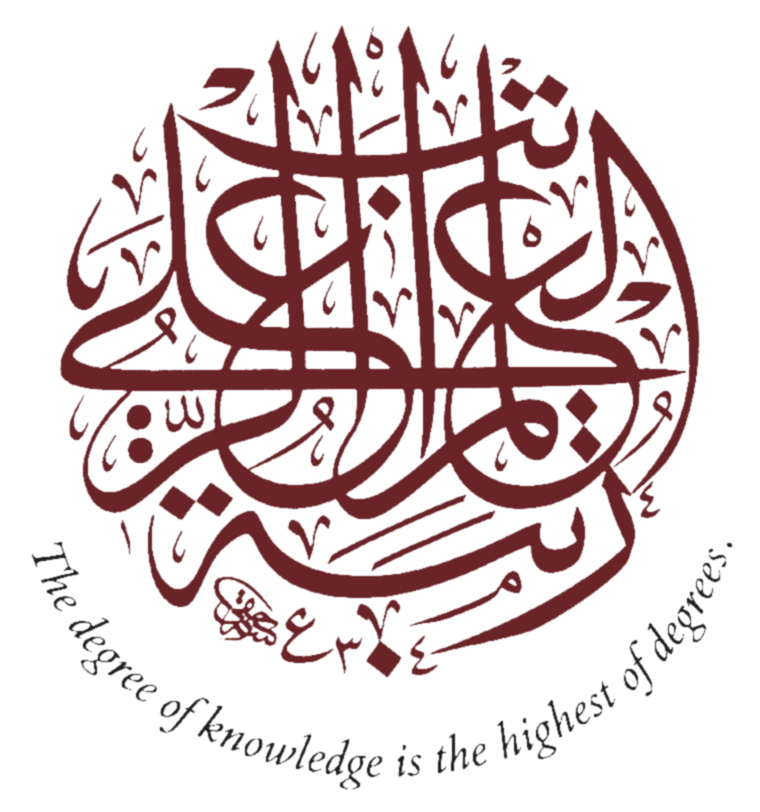
The efficient cause involves questions of pedagogy: How do we impart knowledge? It involves both the art and the science of teaching. All of teaching is either inductive (working from particulars toward universals) or deductive (working from universals toward particulars). Teaching can also be didactic or dialectical, the highest form being dialectical. At Zaytuna, we seek to revive the didactic element of teaching because it was characteristic of the scholastic methods of both the Arabic and Latin traditions as a prerequisite to the dialectical element, and also because it enriches discussion. Some liberal arts colleges no longer use the didactic method, but the lecture ought to be revered as much as rigorous discussion. A good lecture is the only way in which mature, masterly acts of reasoning can be exemplified for a student directly. For this to happen, one must attend not only to what is said—and the what is of extreme importance—but to how one unfolds meaning in time.
In making ideas manifest for others by the artful use of words, the orderly acts of the intellect, and the clarity and arrangement of discourse, the lecturer bids the student to follow a way of thinking that originates in the content and spirit of a canon of texts. Furthermore, when reading the texts in their original languages, lecturers ought to be compelled, as it were, by an intellectual law of gravity to keep close to the firm ground of the text—the grammatical possibilities and the semantic fields created by the richness of Arabic etymology. The lecturer proceeds to practice the exegetical skills necessary to evince the unity of a passage or of a number of passages in a text. Considered in this light, lectures can be understood as living commentaries, and the students who follow them collaborators in an ancient scholarly art.
Finally, we have the formal cause, which gets to the essence of education, given the formal cause’s profound relationship to the efficient cause, as the formal cause is first an exemplary cause. Hence, the formal cause involves both the pedagogy and the curriculum. The curriculum must consistently be informed by the language arts of grammar, logic, and rhetoric. Books are approached with an understanding that language allows multiple possibilities, and one must strive to determine the author’s intent in didactic works, while more freedom exists in works of literature and poetry. Logic enables us to determine the soundness of the reasoning, and rhetoric to assess the merit of the artifice.
The ultimate aim of education is the inculcation of the love of beauty, truth, and goodness in a human being. Muslims call the highest truth iman, or a firm conviction of God’s existence and providence; we call goodness islam, or submission and resignation to God’s will and action in accordance with it, on earth as it is in heaven; and we term beauty ihsan, which literally can mean “to make beautiful,” “to reflect beauty,” and “to perceive beauty.” Each of these is reflected in the arts of freedom: grammar is man’s greatest good; logic makes him capable of recognizing truth and seeing falsehood in its absence; and rhetoric enables him to transmit beauty in all he does. With mastery of these arts, we can embark on the discovery of the absolute by light of reason only, free of the constraints of our senses, resulting in the perception (marifah) of reality, where at last we find peace and understanding.


